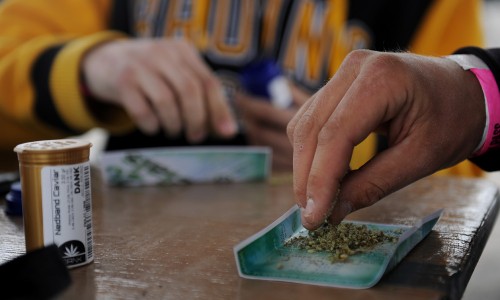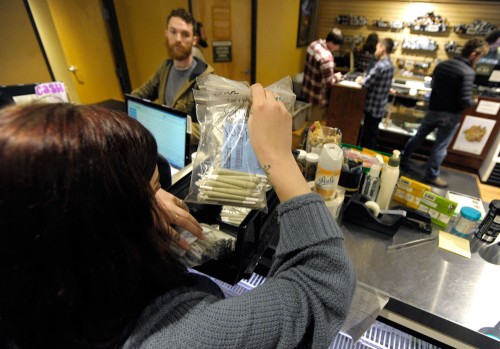Surveys of Boulder County teenagers show that a substantial majority view binge-drinking as a harmful behavior. A much smaller majority sees regular marijuana use in the same light.
Public health officials fear that the recent legalization of marijuana gives too many teenagers and parents the impression that it is safe.
Marijuana stats
Federal Survey Says: Marijuana use by U.S. adults doubles in decade
Legal marijuana sales: Get monthly updates on Colorado cannabis sales
What percentage of Colorado uses marijuana? State survey results are in
NEW: Get podcasts of The Cannabist Show.
Subscribe to our newsletter here.
Watch The Cannabist Show.
Boulder plans to make up to $250,000 available next year for education efforts aimed at changing perceptions and reducing marijuana use among young people.
“There could be a perception that because it’s legal, it’s not harmful,” Karen Rahn, Boulder’s director of Human Services, told the City Council last week. “That perception is there with alcohol too, but because marijuana has recently been legalized, there is a window of opportunity to influence public perception.”
However, at the urging of the Boulder City Council, those grants will focus on comprehensive substance abuse education rather than more directly on marijuana.
“I have a high school daughter right now and you hear about things going on,” Councilman Andrew Shoemaker said. “I hear about marijuana, but I also hear a lot more about alcohol. I don’t want to miss an opportunity. If we’re doing this work, we should be also doing it for alcohol.”
Shoemaker said focusing too much on the dangers of marijuana runs the risk of making alcohol seem relatively safer in a community that still has significant problems with underage drinking and alcohol abuse.

“If you focus on one over the other, you’re telling kids that one is better than the other,” he said. “The message should be that they are all bad if you abuse them, and you shouldn’t do them if you are underage.”
Rahn said the request for proposals, which will go out before the end of this year, with programs to be funded early next year, will reflect that broader focus.
Andrea Poniers, Boulder County Community Health division manager, said county public health officials support expanding the message beyond marijuana.
“Because of the legalization of marijuana, we have been focused on marijuana and with good cause, but we are supportive of the move the council made to broaden this,” she said.
“Substance use rarely happens in isolation. Someone using marijuana is probably using other things. The messages for kids focus around finding those refusal skills and finding other things they feel good about in life.”
‘We want to have a unified message’
Boulder County Public Health coordinates the Reducing Substance Abuse Coalition, which includes Boulder Community Health, the Healthy Youth Alliance, the Boulder Valley School District, Mental Health Partners, Clinica Campesina and other community groups.
Poniers said the coalition plans to respond to the request for proposals when it is issued.

Rahn said the grants are intended for groups already working on substance abuse issues with youth in the city of Boulder. The city’s money should help create consistency in the messages provided by different organizations and improve their ability to reach more people. The city is looking for programs that it can fund over three to five years to give time for the messages to change public attitudes. Rahn said the programs would use evidence-based approaches and avoid scare tactics.”
“We want to have a unified message, and we want to leverage existing efforts,” she said.
Poniers said there needs to be more research on the long-term impacts of marijuana use, but regular use has been shown to slow the development of the brain in teenagers and young adults.
“There is no doubt that for youth marijuana is an issue for the developing brain,” she said. “But alcohol also has a very large impact on our community. Alcohol has a larger social cost, and there are more long-term health effects. But one of the problems with marijuana is we don’t have a lot of information about the long-term health effects.”
Potential additional education on edibles
In the 2013 Youth Risk Behavior Survey, only 55 percent of BVSD high school students thought people who use marijuana regularly have a moderate or great risk of harming themselves, while 83 percent thought those who binge drink each weekend have a moderate or great risk of harming themselves.
Even as the perception of risk is going down, the 2013 Healthy Kids Colorado Survey found that the number of teenagers who had ever tried marijuana declined from 39 percent in 2011 to 37 percent in 2013 and those who had used it in the last 30 days declined from 22 percent in 2011 to 20 percent in 2013. The decrease was not considered statistically significant. The 2015 Healthy Kids survey is being conducted now, with results to be released in 2016.
The city may also give money to efforts to educate parents about preventing accidental ingestion of edibles by young children. Hospital admissions for accidental ingestion have increased threefold since recreational marijuana was legalized, according to the Colorado Department of Public Health and Environment.
Shawn Coleman, a lobbyist who represents marijuana businesses in Boulder, said it’s not surprising that the city would put money into education, as that was one of the allowed uses for a special marijuana tax approved by voters in 2013. However, without evidence that teen use is increasing, he would like to see some of that money go for more clerks and inspectors so that it is easier for businesses to renew their licenses and expand their businesses.
In addition to regular sales tax, Boulder has an additional 3.5 percent sales tax on recreational marijuana and a 5 percent excise tax, approved by voters in 2013. The ballot language says that tax revenue should go first for administration and law enforcement resources related to marijuana, then for “treatment, education, responsible use, intervention and monitoring with an emphasis on youth,” then for the general fund.
In 2014, those marijuana-specific taxes generated $1.05 million, and the city had collected $1.6 million as of September of this year, the most recent month for which final sales tax numbers are available.
Erica Meltzer: 303-473-1355, meltzere@dailycamera.com or twitter.com/meltzere
